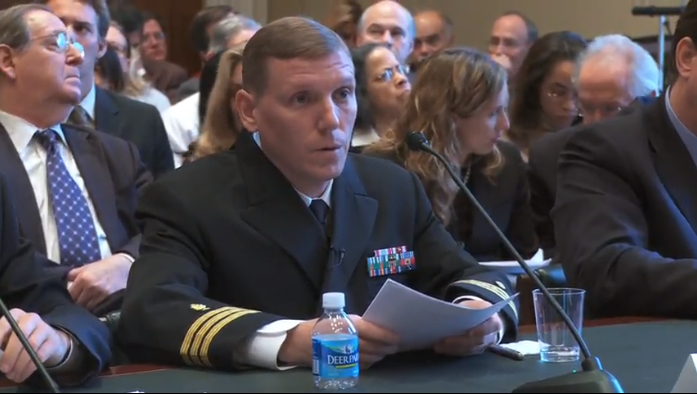
Japan: The “Black Hole” For Abducted Children
 Japan is called “a black hole” where once abducted children enter, they never return. No one knows this painful reality better than Paul Toland, a left-behind parent whose daughter, Erika, was abducted to Japan in 2003 and has been held there since.
Japan is called “a black hole” where once abducted children enter, they never return. No one knows this painful reality better than Paul Toland, a left-behind parent whose daughter, Erika, was abducted to Japan in 2003 and has been held there since.
Toland is a commander in the U.S. Navy, has testified before Congress (pictured) on this issue, and co-founded the organization Bring Abducted Children Home, which is dedicated to the immediate return of internationally abducted children who are being wrongfully detained in Japan.
He talked with MensRights.com about his organization, his thwarted attempts to see his daughter, and why the United States continues to tolerate this type of behavior from Japan.
Men’s Rights: First off, Paul, how many children in total have been stolen off American soil and abducted to Japan?
Paul Toland: The State Department last reported in August 2011 that there were 268 cases involving 374 children abducted over the past 17 years. The actual number is much higher but there are a lot of people who don’t report their case to the State Department because the Department really can’t offer much help when it comes to Japan.
Additionally, there are many Americans living in Japan – including 40,000 plus military members. So for example, if they’re living in Japan on a military base and their child is stolen off the military base, that’s also not reported in the State Department’s numbers.
Men’s Rights: How did Japan come to be known as what you called it during the Congressional hearing “a black hole” where once abducted children enter, they never return?
Paul Toland: The National Center for Missing Exploited Children has actually done research all the way back to the Treaty of San Francisco in 1952 when sovereignty was returned to Japan after World War II.
Since that time, there has not been a single case found of the Japanese court returning a child that’s been abducted to Japan. So that’s 60 years and thousands of children – not just from the United States, but from many, many other countries – who have gone into Japan and have never come out as the result of any Japanese court action. So, it’s truly a black hole and the State Department as much as admits this on their website.
When a child has gone into Japan, there’s no hope. They’re gone forever and, additionally, Japan doesn’t offer any visitation rights. There’s no mechanism for visitation or for getting a child back.
There are absolutely no rights for a parent who has had their child abducted to Japan. It’s pretty much a hopeless case.
Read Related Article: “David Goldman on The Effects of Child Abduction on Fathers“
Men’s Rights: Why do you think the United States continues to tolerate this type of behavior from Japan, a nation we are close allies with?
Paul Toland: Japan has done it for 60 years and there have been no consequences for Japan or any other nation who refused to return children. There are a few voices in the government that are trying to make change, but there is very few.
Congressman Chris Smith is trying to make some changes. He has a good bill called HR 1940 that provides the government with tools to appose consequences on nations who refuse to return children.
I hope people support bills like that – I hope Congress supports it – because the time for action is now.
Let me tell you, as the parent of a child who’s growing up in a foreign land, time is not on my side. Every day that goes by is a day that I’ve missed with my daughter.
Men’s Rights: As mentioned, your daughter Erika (pictured) was abducted to Japan in 2003. When was the last time you talked to her?
 Paul Toland: I had a few encounters; a few times that I actually went there. I had two visitations in Japan early on, but they were monitored visitations even though I’ve never committed any crime.
Paul Toland: I had a few encounters; a few times that I actually went there. I had two visitations in Japan early on, but they were monitored visitations even though I’ve never committed any crime.
They do this in Japan so that a re-abduction does not occur. It’s almost like the first abduction is free, but after that, they don’t want any opportunities for a re-abduction once it’s entered the court system.
So the visits were heavily monitored with court supervisors in there and attorneys watching through one-way glass and it being video taped.
Those were the only two times I saw her in Japan. They were very short periods of time – 20 minutes each time – and both those times were within a year after the abduction happened.
Other than that, it’s been impossible. After I moved back to the states, I couldn’t set up any visitation with her. I traveled back on my own in 2009 and stood out on the street corner, waited for her to get out of school, and gave her her birthday presents at that time.
I went back again this past year, 2011, after the tsunami and earthquake and tried to see her, but the grandmother – who’s holding my daughter – basically holed herself up in a high-rise apartment and would not let me see Erika and called the police every time I came to the apartment to try to see them.
So, there’s been no way that I’ve been able to see her.
Men’s Rights: You mentioned that you’ve tried all these different avenues to get your daughter returned, but Japanese law does not recognize U.S. custody orders or arrest warrants.
Japan is not a signatory to the Hague Treaty, which leaves the U.S. Government with no legal recourse in these situations. Christopher Savoie, a fellow co-founder with you at Bring Abducted Children Home, was even put in prison for trying to get his children back from Japan and return them to the United States after they had been abducted.
So, obviously, there are great obstacles in your way. How do you overcome these large roadblocks to enact reform?
Paul Toland: Well, in the case of abduction to Japan, the law is not on anyone’s side – no matter who you are – because Japan just completely ignores international law in this area. So it really has to become a bilateral, nation-to-nation issue between the U.S. and Japan.
Our organization, Bring Abducted Children Home, has worked hard, working with government leaders, and working to bring awareness to this issue to make this a major bilateral issue between the U.S. and Japan.
You can learn more about Toland and the Bring Abducted Children Home Organization by visiting BAChome.org.
It has succeeded to the extent that it has risen all the way to the President’s level. Every meeting now that President Obama has with the Prime Minister of Japan, he raises the issue of international child abduction. He raises the issue of the existing cases as well because even if Japan signs the Hague Treaty, the 300-plus cases that are out there will not be resolved because The Hague is not retroactive.
So, we’ve made enough noise that it has reached the President’s level. However, you can’t say it’s successful because not one child has been returned even though the President is addressing it with the Prime Minister of Japan. There still hasn’t been one child returned and that’s how we’re going to judge success.
One of my favorite quotes is from Benjamin Franklin. He says, “Never confuse motion with action,” and right now, we consider all that the government’s done so far a lot of motion, but real action will be getting our children back.
We formed Bring Abducted Children Home to overcome these roadblocks and it focuses twofold. First, I’m working with our government to bring change and secondly, public awareness to bring change.
That’s why I’m with you today, trying to raise public awareness about this issue. In the end, we hope the Congressional pressure from our Congress and from our government – along with public awareness – will bring the changes that are needed.
Change does not come quickly in Japan. There is no “grassroots” movement; it’s not that type of country. Most major changes in Japan are the result of foreign pressure for intervention.
Japan wants to be an accepted part of the world community and when their policies are out of step with the rest of the world, it shames them into changing. That’s how major changes are made there, and that’s how we want this change to be made in Japan.
Watch Paul Toland’s DadsDivorce Live interview:
